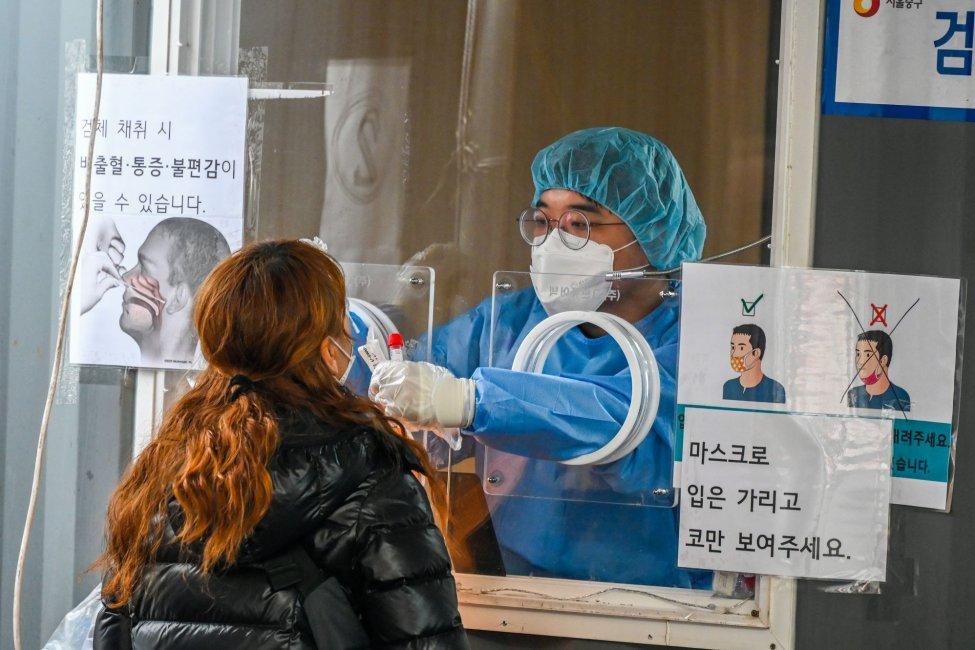South Korea has reported a total of 2.3 million cases since the pandemic began, with 7,607 deaths.


Seoul: South Korea's Prime Minister on Wednesday called on people not to panic about a major increase in coronavirus infections as new daily cases surged past 170,000 for the first time.
Serious cases and deaths are at manageable levels despite record cases caused by the highly infectious Omicron variant, Prime Minister Kim Boo-kyum told a pandemic response meeting.
"Although our awareness and implementation of anti-COVID rules should not be loosened, there is no reason at all to fear or panic about the numbers of new cases as in the past," he said, according to a transcript.
South Korea reported 171,452 new coronavirus cases for Tuesday, another daily record and a sharp increase from 99,573 a day before, the Korea Disease Control and Prevention Agency said on Wednesday.
Deaths have slowly ticked up, reaching a near-record high 99 on Tuesday, but South Korean authorities say real-world data shows people infected with the Omicron coronavirus variant are nearly 75% less likely to develop serious illness or die than those who contract the Delta variant.
A study by the Korea Disease Control and Prevention Agency (KDCA) of some 67,200 infections confirmed since December showed the Omicron variant's severity and death rates averaged 0.38% and 0.18%, respectively, compared with 1.4% and 0.7% for the Delta cases.
Around 56% of 1,073 people who died over a five week period were either unvaccinated or had received only one dose, the study showed, with people aged 60 or older accounting for 94% of deaths, officials said on Monday.
More than 86% of South Korea's 52 million population have been double vaccinated and nearly 60% have received a booster shot.
South Korea has approved Pfizer's (PFE.N) COVID-19 vaccine for use with children aged 5-11, the country's food and drug ministry said on Wednesday. read more
Children should get one-third of the regular dose, administered twice with a three week interval, the ministry said in a statement. Children with significantly declined immunity can get a booster four weeks later.
Kim said social distancing rules will be relaxed after the current wave peaks, which some experts estimate may come in mid-March.
"Omicron's spread is still racing to its peak, but once it is assured that severe cases and deaths can be stably managed, we will reform the broad framework of our anti-virus quarantine policy including social distancing," Kim said.
Current rules include mask mandates for public places, vaccine passes for certain locations and events, a six-person limit on private gatherings, a 10 p.m. curfew for eateries and a seven-day quarantine for international arrivals.
South Korea has reported a total of 2.3 million cases since the pandemic began, with 7,607 deaths.
SOURCE: REUTERS
Global oil and gas shipping costs surge as Iran vows to close Strait of Hormuz
- 17 hours ago
Hockey World Cup Qualifier: Pakistan beat Malaysia to reach semi-finals
- 2 days ago
Apple launches new generation of MacBook laptops starting at $1,099
- 18 hours ago
Iran war enters fourth day in 'smoke and blood' as markets slide
- 18 hours ago

Ultrahuman’s new flagship smart ring has a 15-day battery life
- a day ago

Meet the toymaker who helped take down Trump’s tariffs
- a day ago

What does “America First” even mean anymore?
- 21 hours ago

Trump’s Iran war is uniting a strange new anti-war alliance
- a day ago

Do you need to know who you’d be without antidepressants?
- 6 hours ago
US Marines fired on protesters storming consulate in Karachi, officials say: Reuters
- a day ago
67 Afghan Taliban operatives killed in latest repulsive attacks: Tarar
- a day ago

The Supreme Court appears likely to let stoners own guns
- 6 hours ago







